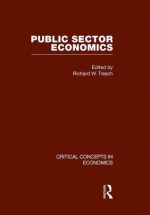Tab Article
How does government taxing and spending affect an economy, and how can we determine whether government policies promote a society’s economic objectives? What economic activities should governments undertake? Should they do less? How should an optimal tax system be designed? What information is required to determine the best possible distribution of income? And what are the advantages (or otherwise) of a federalist structure of government?
These are the kind of dizzying questions addressed by those working in public sector economics, and this new title in the Routledge series, Critical Concepts in Economics, meets the need for an authoritative reference work to make sense of the subdiscipline’s vast literature and the continuing explosion in research output.
Edited by Richard W. Tresch, author of a leading graduate textbook in the field, and a proponent of the mainstream theory of the public sector, this new Routledge Major Work brings together in four volumes the foundational and the very best cutting-edge scholarship to provide comprehensive coverage of many of the subdiscipline’s most important topics.
Volume I (‘Public Expenditures’) assembles the key work on the responses of governments to markets for desired goods and services that operate inefficiently or not at all. The main questions addressed include: what markets should a government become involved in to restore efficiency to the economy? How should it proceed in each instance to promote efficiency? And what are the factors that impede its efforts to restore efficiency?
Volume II (‘Taxation’) collects the most important research on taxation and the principal normative issue of how best to design good taxes from an economic perspective (i.e. taxes that are simple, equitable, and do the least harm to a government’s pursuit of efficiency). Issues explored here include the two main positive economic questions associated with taxation: how do the main taxes that governments use affect economic behaviour, primarily the supply of labour, saving and investment, and the incentives to evade paying these taxes; and tax incidence—who bears the burden of these taxes?
Volume III (‘Distribution’) brings together the best work on the pursuit of equity by governments through its taxes and transfer payments. Fundamental questions tackled include the optimal amount of redistribution a government should undertake through taxes and transfers, and how it should best design its transfer programmes to meet distributional goals.
The scholarship assembled in the final volume (‘Federalism’) explores the special problems that arise from having a tiered system of (supra-)national, state or provincial, and local governments. Primary issues within federalism include questions about which levels of government should perform the various legitimate functions of government, and how the movement of people in response to state/provincial and local taxes and expenditures affect the quest for equitable and efficient government policies. This volume also covers the important subsidiary debate over the use and effects of grants-in-aid from higher-level to lower-level governments.
Fully indexed and with a useful introduction to the collection, newly written by the editor, which places the collected material in its historical and intellectual context, Public Sector Economics is an essential work of reference. It is destined to be valued by scholars and students as a vital research resource.


